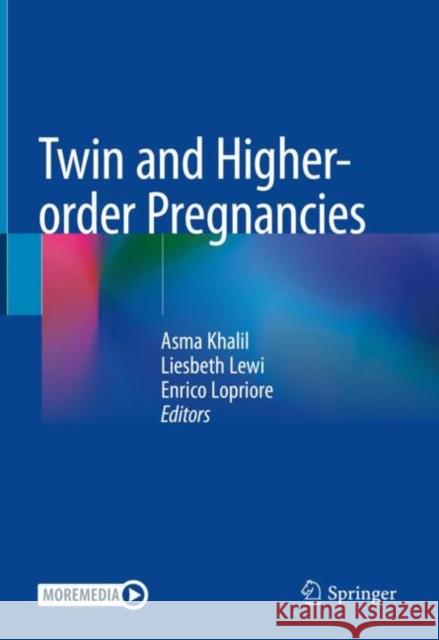Twin and Higher-Order Pregnancies » książka



Twin and Higher-Order Pregnancies
ISBN-13: 9783030476519 / Angielski / Twarda / 2021 / 470 str.
Twin and Higher-Order Pregnancies
ISBN-13: 9783030476519 / Angielski / Twarda / 2021 / 470 str.
(netto: 651,74 VAT: 5%)
Najniższa cena z 30 dni: 655,41
ok. 16-18 dni roboczych.
Darmowa dostawa!
Section I Biology: Zygocity and chorionicity OR Biology and genetics of dizygotic and monozygotic twinning.- The vanishing twin.- Genomic studies of complex traits: the value of twins.- Placentation in multiple pregnancy.- ‘Omic’ twin studies.- Section I Epidemiology: Epidemiology of twins and multiple pregnancy.- Assisted conception and multiple pregnancy.- Emerging methods in twin research.- Section III Antenatal Care in twins and multiple pregnancy: Dating of the pregnancy (determining the gestational age).- Determining chorionicity and amnionicity.- Twin labelling, timing, frequency and content of ultrasound assessment.- Prenatal screening for and diagnosis of aneuploidy.- Screening for structural abnormalities.- Assessment of fetal growth in twins and multiple pregnancy.- Section IV Prenatal complications in multiple pregnancy: Twin pregnancies discordant for fetal anomaly.- Fetal reduction/selective termination in uncomplicated twins and multiple pregnancy.- Preterm birth in twins and multiple pregnancy.- Fetal growth restriction.- Stillbirth and single inutero death .- Section V Complications unique to monochorionic twin pregnancies: Twin to twin transfusion syndrome.- Twin anaemia polycythaemia sequence.- Twin reversed arterial perfusion sequence.- Monochorionic monoamniotic twin pregnancy.- Diagnosis and management of conjoined twins.- Section VI Peripartum care: Timing of birth in uncomplicated twin pregnancy.- Mode of delivery in twin pregnancy and delivery of the second twin.- Analgesia and anaesthetic consideration.- Postpartum hemorrhage and maternal morbidity in multiple pregnancy.- Section VII Postnatal care: Breast feeding twins and multiples.- Postpartum depression and psychiatric considerations.- Postnatal neonatal assessment in multiple pregnancy.- Support after single loss in twin and multiple pregnancy.- Section VIII Childhood development: Cerebral palsy and neurodevelopmental delay in multiple pregnancy.- Long term follow-up: indications and methodology.- Neuroimaging & the brain; the role of twin studies.- Section IX Research, registries and Parent views: Research studies in twins and multiple pregnancy (Global Twins and Multiples Priority Setting Partnership).- Twin and multiple pregnancy registries.- Twin and multiple pregnancy: patient voice.
Asma Khalil, MBBCh MD MRCOG MSc, is a Professor of Maternal and Fetal Medicine and head of the Multiple Pregnancy service at St George’s Hospital, London, the primary referral centre for prenatal diagnosis and fetal therapy for multiple pregnancy in the South West region. She has organised several successful educational courses on “Multiple Pregnancy”, and is a frequently invited national and international speaker on the management of twin pregnancy. She was awarded a NICE (National Institute of Health and Care Excellence) Fellowship (2013-2016) and was a member of the NICE Quality Standards Committee. She is involved in many committee and advisory roles including Expert Adviser for the NICE Centre for Guidelines, and is an International Society of Ultrasound in Obstetrics and Gynecology (ISUOG) Ambassador. She has successfully led to completion an ISUOG Clinical Standard on the role of ultrasound in the management of twin pregnancy. In addition to serving as Chief Investigator for a number of multi-centre studies focusing on twins and multiple pregnancy, she set up the UK’s first national Twin to Twin Transfusion Syndrome Registry.
Liesbeth Lewi, MD PhD, is a Professor of Fetal Medicine and head of the Multiple Pregnancy service at the University Hospitals Leuven, Belgium, which is a national and international referral centre for complicated multiple twin pregnancies. She obtained a PhD degree in 2008 with her work on placental examination in complicated monochorionic twin pregnancies. She is a frequently invited speaker at national and international meetings on the management of twin pregnancies. She has published extensively on the subject of monochorionic pregnancies in several peer reviewed journals and international textbooks.
Enrico Lopriore is a Professor of Neonatology and Fetal Medicine and head of the Neonatal Intensive Care Unit at Leiden University Medical Center (LUMC). He completed medical school and his doctoral research at Leiden University, with a thesis on ‘Twin-to-twin transfusion syndrome: from placental anastomoses to long-term outcome’ in 2006. He was appointed a Professor of Neonatology at the LUMC in 2016. His research mainly focuses on the origin, management and outcome of various fetal disorders, including complicated monochorionic twins (with TTS, TAPS or sIUGR) and fetal hematologic diseases (anemia or thrombocytopenia). The ultimate goal of his research is to improve perinatal survival and in particular the long-term outcome for these at-risk babies.
This book provides a comprehensive update on the management of multiple pregnancy, which is becoming more common, and is associated with increased maternal and perinatal mortality and morbidity. Offering a practical guide and a wealth of videos, images and illustrations, the book will help clinicians to feel more confident when caring for women with multiple pregnancy.
Its main objectives are:
- To increase the level of knowledge of healthcare professionals involved in the care of these women;
- To update their knowledge in keeping with the recommendations of the latest national and international guidelines; and
- To promote a multidisciplinary approach to the management of women with multiple pregnancy.
1997-2026 DolnySlask.com Agencja Internetowa
KrainaKsiazek.PL - Księgarnia Internetowa









